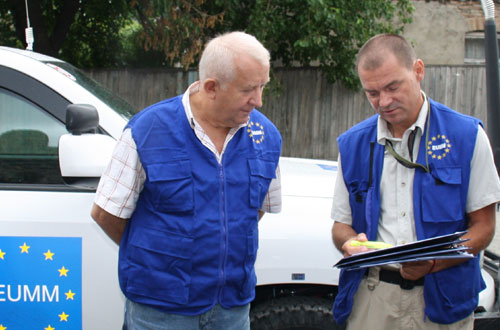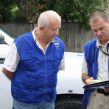
Georgia’s Reset and Russia’s Response (Part Two)
Publication: Eurasia Daily Monitor Volume: 10 Issue: 111
By:

The construction of barbed wire fences by Russian border troops, crossing from South Ossetia into previously uncontested Georgian territory (see Part One, EDM, June 11), caught Tbilisi and its Western partners by surprise. With this operation, Russia de facto annexed several additional bits of Georgian territory, up to 300 meters beyond the occupation line. This sufficed to demonstrate that Russia holds full sway over the situation and can act with impunity. At the same time, the limited scale of the provocation allowed the United States and the European Union to avoid taking up this issue with Russia.
Moscow is hardly interested in a land grab per se, and a minor one at that. Rather, it made this move to impose its own terms on the process of “normalizing” Russia-Georgia relations. Georgian Prime Minister Bidzina Ivanishvili and members of his government had declared (Ivanishvili as recently as May 26) that strengthening Georgia’s partnerships with the North Atlantic Treaty Organization (NATO) and the European Union went hand in hand with efforts to improve Georgia-Russia relations. Russia’s construction of barbed-wire fences across the occupation line, however, served to remind Tbilisi of what Moscow terms “the new geopolitical realities” post 2008.
Underscoring that point, Deputy Minister of Foreign Affairs Aleksandr Grushko declared that Russian border troops protect the South Ossetia-Georgia “state border” by agreement with South Ossetia, and deemed it necessary to determine the line of that border. Grushko and the Tskhinvali authorities publicly advised Georgia to negotiate with South Ossetia about their shared “border” (Interfax, June 5; Res, June 6).
Russia’s unexpected move revealed the inadequacy of existing arrangements for early warning and resolution of disputes. The European Union’s Monitoring Mission (EUMM) monitors the occupation line from the Georgian side, but Russia bars the EUMM from entering the occupied territories. The EUMM proved powerless to react to the installation of barbed wire fences on the side that it does monitor.
EUMM’s chief, Andrzej Tyszkiewicz, now completing his two-year assignment, was declared persona non grata by the Abkhaz authorities in April 2012. That move forced an indefinite suspension of the Incident Prevention and Response Mechanism’s (IPRM) meetings with Abkhaz authorities. (The issue of barbed wire fences did not arise there because the occupation line runs along the Inguri River.) IPRM’s May 31 meeting in South Ossetia, on the other hand, ended in deadlock.
The next meeting of the highest available forum, the Geneva Discussions, is scheduled to take place toward the end of June and cannot discuss the fence construction issue until then. Meanwhile, some Georgian and international officials are casting this issue as one of human rights and property rights. The new fence restricts the freedom of movement and encroaches on the land of local residents, dividing farmsteads, and blocking access to water sources in several villages (Rezonansi, June 7).
Framing the issue in that way, however, cannot replace, but only supplement, political and diplomatic steps by Georgia’s Western partners to raise the cost of Moscow’s rogue behavior and forestall its recurrence.
Georgia’s unsettled political situation compromises the state’s capacity to address such challenges effectively. As Prime Minister Bidzina Ivanishvili’s team does not co-habitate with President Mikheil Saakashvili in any real sense, Georgia’s National Security Council (subordinated to the president) has been unable to meet ever since the October 2012 change of government. The NSC finally met at Saakashvili’s insistence on June 5 to discuss the situation, nine days after Russian troops had started installing the barbed-wire fence. Ivanishvili refused to attend the meeting and instructed some of his ministers to discuss extraneous matters; but the ministers in attendance behaved responsibly, and the meeting seemed to result in a consensus. The opposition United National Movement’s parliamentary leader, Davit Bakradze, called for a cross-party resolution to be worked out as a demonstration of unity on matters of national interest, but, nevertheless, the governing Georgian Dream coalition did not go along with this proposal (Civil Georgia, Interpress, June 5: Rezonansi, June 7).




